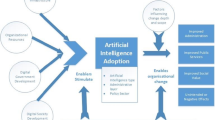
Overview
- Offers a comprehensive understanding of the challenges and opportunities of AI for Latin American governments
- Addresses legal frameworks, infrastructure, resistance, and the regional digital divide
- Explores ethical considerations for AI in government processes
Part of the book series: Public Administration and Information Technology (PAIT, volume 41)
Access this book
Tax calculation will be finalised at checkout
Other ways to access
About this book
This edited volume discusses the challenges of digital transformation in Latin America, specifically regarding the use of AI for government management in the public sector. This book brings together leading scholars and practitioners from the region to address the legal and regulatory frameworks needed to introduce AI into government processes, as well as the infrastructure requirements for successful implementation. It explores potential resistance from public officials towards technology adoption and ways to overcome it. Moreover, the book considers the digital divide that exists within Latin American societies, which may hinder access to AI tools for some citizens. It also discusses ethical considerations related to AI use in government processes, such as privacy concerns and algorithmic bias. Providing a comprehensive understanding of the challenges and opportunities that AI presents for Latin American governments, this volume will be of use to students and scholars interested in governance, public management, AI, and Latin American studies.
Similar content being viewed by others
Table of contents (10 chapters)
-
Front Matter
-
Introduction to Artificial Intelligence
-
Front Matter
-
-
Benefits and Challenges of Implementation of AI in the Public Sector
-
Front Matter
-
-
Governance and Regulation of AI in the Public Sector
-
Front Matter
-
-
Tools and Techniques for Information Management with AI
-
Front Matter
-
Editors and Affiliations
About the editors
Rodrigo Sandoval-Almazan is an Associate Professor at the Political Sciences and Social Sciences Department in the Autonomous University of the State of Mexico, in Toluca City. He is a Member of the Mexican Academy of Science since 2018. Dr. Sandoval-Almazan is the author or co-author of articles in scholarly journals such as Government Information Quarterly, Information Polity, First Monday; Journal of Information Technology for Development; Journal of Organizational Computing and Electronic Commerce; International Journal of E-Politics. He is associate Editor of the Government Information Quarterly and founder of the Public Innovation and Artificial Intelligence Lab in Mexico (i-LabMexico). His research interests include artificial intelligence in government; social media platforms for government; metrics for digital government, and open government.
David Valle-Cruz is an Assistant Professor at the Professional Academic Unit Tianguistenco at the the Autonomous University of the State of Mexico and is a member of the Mexican National System of Researchers. David is a Computer Engineer, he holds a Master of Informatics, and a Ph.D. in Economics and Management. He has been a visiting researcher at the Center for Technology in Government (CTG), SUNY Albany, NY, and at the Computer Science and Multi-Agent Systems Laboratory of CINVESTAV, Guadalajara, Mexico. His articles have been published in leading journals, including Government Information Quarterly, Cognitive Computation, First Monday, Information Polity, and International Journal of Public Sector Management (among others). His research interests are related to Applied Artificial Intelligence, Social Media, and Emerging Technologies in the Public Sector.
Accessibility Information
PDF accessibility summary
This PDF does not fully comply with PDF/UA standards, but does feature limited screen reader support, described non-text content (images, graphs), bookmarks for easy navigation and searchable, selectable text. Users of assistive technologies may experience difficulty navigating or interpreting content in this document. We recognize the importance of accessibility, and we welcome queries about accessibility for any of our products. If you have a question or an access need, please get in touch with us at accessibilitysupport@springernature.com.
EPUB accessibility summary
This ebook is designed with accessibility in mind, aiming to meet the ePub Accessibility 1.0 AA and WCAG 2.0 Level AA standards. Its features include descriptions for images and other non-text content, as well as rich navigation that is compatible with screen readers. We recognize the importance of accessibility, and we welcome queries about accessibility for any of our products. If you have a question or an access need, please get in touch with us at accessibilitysupport@springernature.com.
Bibliographic Information
Book Title: Artificial Intelligence in Government
Book Subtitle: Latin America Challenges and Expectations
Editors: Rodrigo Sandoval-Almazán, David Valle-Cruz
Series Title: Public Administration and Information Technology
DOI: https://doi.org/10.1007/978-3-031-87623-3
Publisher: Springer Cham
eBook Packages: Political Science and International Studies, Political Science and International Studies (R0)
Copyright Information: The Editor(s) (if applicable) and The Author(s), under exclusive license to Springer Nature Switzerland AG 2025
Hardcover ISBN: 978-3-031-87622-6Published: 19 June 2025
Softcover ISBN: 978-3-031-87625-7Due: 03 July 2026
eBook ISBN: 978-3-031-87623-3Published: 18 June 2025
Series ISSN: 2512-1812
Series E-ISSN: 2512-1839
Edition Number: 1
Number of Pages: VI, 253
Number of Illustrations: 5 b/w illustrations, 33 illustrations in colour
Topics: Governance and Government, Science and Technology Studies, Public Policy, Public Administration


